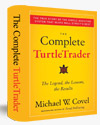The Complete Turtle Trader
 As much as I love trading, it’s no coincidence that I frequently have my nose in a trading-related book. I stay away from the how-to books these days, sticking primarily to interview-style books, conceptual trading books, or just ones which tend to tell a good story.
As much as I love trading, it’s no coincidence that I frequently have my nose in a trading-related book. I stay away from the how-to books these days, sticking primarily to interview-style books, conceptual trading books, or just ones which tend to tell a good story.
One benefit of writing a blog is the occasional opportunity to check out a book straight from the author, so when Michael Covel offered to send me a copy of The Complete Turtle Trader, it was an easy decision to respond with a resounding “yes.” Now, I’m ashamed to say that it has taken me some time to get to this book (my apologies, Michael!), but once I was able to start reading it, it didn’t take me long at all to finish it.
I quickly realized that The Complete Turtle Trader contained a little bit of everything I like in a trading book. There are numerous quotes from turtle traders and others surrounding the famed experiment which give portions of it an interview feel, there’s plenty of discussion on the concept of the turtle trading method and objectives, and to see the puzzle pieces get put together the way Michael did it certainly tells a good trading story!
About The Turtle Traders
The great turtle trading experiment began in 1983 when Richard Dennis and William Eckhardt decided to take a friendly wager to the next level: they recruited and trained non-traders to see if they could become successful traders using their system. People from many walks of life ultimately joined the team, and the legend began. Dennis and Eckhardt combined for quite a team, with Dennis being described as a pure trader with an incredible feel for market psychology, while Eckhardt was a mathematician who calculated the formulas behind the turtle method. Their decision to hire trainees proved to be extremely successful, and the tale has been told in various ways since then.
Reader Benefits & Impressions
As a full-time trader, I’d certainly heard of the experiment, so I was eager to see what The Complete Turtle Trader had to say. As I progressed through the book, I learned a great deal more about the entire process than I had ever realized before. Amounts made and lost, drop-outs and primadonnas, just what the turtles were doing and trading, and oddly, how much time they spent just letting their positions run.
Here are a few parts of the book which stood out to me:
* Richard Dennis, who funded the experiment, felt that money was purely a way to keep score in the game, which is likely a big part of why he was so successful – his emotions didn’t interfere with his trading process. Interestingly, Dennis was able to successfully blend his bold approach with a healthy dose of respect for the market – two traits which nearly oppose each other but offer the trader two invaluable tools for success.
* The initial training actually began with managing risk. That’s not what one might expect from this famous bet/experiment known for making huge amounts of money, and yet it supports the notion that great traders know how to lose properly.
* Aggressive trading can pay off big, but knowing when to stomp on the gas is the part that many traders miss. Covel mentions that Dennis would go big when he sensed he had an edge, implying that he not only varied his position sizing depending on conditions but also that perhaps he traded much smaller when he lacked conviction. How much difference would it make to your trading results if you hit your favorite setups hard?
* Staying in the present tense and making the best decision “now” will lead to long-term success. Eckhardt knew that how you arrived at your current situation and what you choose to do going forward were separate variables, and he wanted every trader to make the proper decision at all times based on what their rules specified. Covel mentions that Eckhardt “wanted the turtles to literally trade as though they didn’t know what their entry price was.” That speaks volumes to trading your plan and having the discipline to stick with it while ignoring your recent results.
* No guts, no glory. Those who succeeded in the program had undeniable confidence and conviction in their trades, yet balanced that perfectly with a respect for risk. At the end of the day though, the best traders were those who took every opportunity which came along to turn a profit, setting aside any concerns for failure. Courage and determination were far bigger than the rules when it came down to being successful. I’m left with the distinct impression that those who were right frequently with their trades did not make as much as those who nailed the occasional trade with size and held onto it until the trend ended. Much has been made of the Turtle Trading Rules, and yet following them was only a part of how the turtles stayed in the program. Covel states that “if they did not exhibit…a ‘walk-off home run’ mentality every day, they would fail.” Each of them had to have a huge amount of confidence and a major drive to succeed in order to prevail, yet possess the ability to keep their ego in check.
Bottom line: The Complete Turtle Trader is an excellent book which offers loads of wisdom while keeping your interest. The market requires that we’re constantly learning, and this book provided me with a few new lessons while serving to remind me of numerous other valuable trading insights.
Jeff White
President, The Stock Bandit, Inc.
Swing Trading & Day Trading Service
www.TheStockBandit.com
[tags]Stock Market, Day Trading, Stock Trading, Swing Trading, Turtle Trader, Investing[/tags]







David | Apr 24, 2008 | Reply
I was under the impression that, while the Turtles produced some successful traders, not all of the recruits were succesful. I might have read that in one of Jack Schwager’s books, but I might be mistaken.
yo | Apr 24, 2008 | Reply
Agree that it’s a great book.
If you really want to get inta the sideshow about it, there’s a thread at elitetrader where covel and curtis faith get into it big time over the things covel wrote about faith, as well as other historical tidbits about the turtles. Really juicy stuff.
TheStockBandit | Apr 27, 2008 | Reply
David, I believe you are correct regarding not all turtles being successful. I too was given the impression that not everyone was able to stay in the program.
Jeff
Dave | Apr 29, 2008 | Reply
I read the book. A decent read, although not that enthralling. The turtles seemed like fairly dull people frankly. The real life Trading Places analogy gives the book its life (although the analogy doesn’t quite fit when you get down to it. Its not all that shocking that a programmer who works on trading programs actually becomes successful when he is introduced to CTA-style investing). What I havent grasped yet, and this review just reinforces my puzzlement, is if following simple rules without letting emotions throw you off your system is the key to success, than what place does courage and conviction, or a “home run mentality “play in trading success? Those concepts may make for inspiring reading for pro traders or wannabes, but it appears that the real key is a program of risk-management that frankly could be applied to many legitimate investment styles and doesnt necessarily favor trend following. The book is very keen on a principle that the future cant be predicted, and yet traders are encouraged to constantly test new trend following formulas and adapt when current systems don’t work in a new environment. So how is that different than some other type of investor back-testing multiple variables that will work better in building a portfolio of investments. Mr. Covel fails by insisting that markets havent changed to the disadvantage of trend followers over the years since there will always be “buy and hold”ers and even traders who “are willing to lose” to victimize in a zero-sum game. Yet he also insists that trend followers have to continually refine models to adapt to new conditions(?). Testing new formulas on historic data to succeed in future trading ? OK, but dont call that predicting what will happen next…shhhh…. this is “trend following.”
TheStockBandit | Apr 30, 2008 | Reply
Hey Dave, thanks for your comments.
You bring up some valid points here, but I think the “home run mentality” refers not to ignoring simple rules but rather likely points to position sizing. Courage and conviction have a direct impact on ‘how much’ one trades, and I got the impression from the book that Richard Dennis wanted traders who were willing to make bold bets while still respecting their rules. That to me boils down to size, not discipline of cutting losing trades when their rules stated to do so.
Trade well this week!
Jeff
Trading System Reviews | May 1, 2008 | Reply
Just going back to Dave’s comment about not predicting the future, I think the difference is that system traders do not determine whether they did the right thing on the outcome, but the process they followed. So they look at the trade and ask themselves if they took the correct position, size of position etc. based on the rules of their system. The idea being that if you do this you will mirror the results of your system. By comparison discretionary traders judge themselves on the outcome of the trade itself rather than whether they followed the rules – ie did it go the way they thought it would.
For want of a better analogy, if you think about a casino, the blackjack dealers are not paid to try to beat the players, they are paid to follow the rules of when to take another card, stick etc. The casino knows they have an edge and so employ the dealers to exploit their edge and hence reflect the system traders. However the poker players, while knowing the mathematics behind the odds etc. are making judgement calls as to whether their opponent is weak and can be bluffed off the pot or how much they can get away with betting and still get paid when they hit their flush, which is effectively what discretionary traders are doing.
This makes system traders sound very uncreative but disciplined, however you should remember that often the mind that creates the system is often not the one to trade it as they keep making changes on the fly. Covel mentions in the book that Dennis did this frequently and lost some serious amounts at times, it doesn’t directly state this was what caused the blow-ups, but the implication is there. They also mention the other flaw in Dennis’ execution of the strategy when he started altering the size of the accounts each turtle was trading – which is something like altering the bet sizes for blackjack dealers based on the cards that are coming out!
TheStockBandit | May 2, 2008 | Reply
TSR, very well-stated, thank you for your comments.
Sort of goes back to my previous post:
http://www.thestockbandit.net/2008/04/22/good-trades-vs-good-results/
Jeff
Sisheng Zheng | May 16, 2008 | Reply
I am writing in response to Dave’s comments.
1. Indeed not all turtles are successful, but that is not flaw in the system itself, but the personal traits of traders they selected.
2. I agree that turtles are dull, their job is to follow the system and trade. But if that is what makes me real big money I am happy to lead that kind of dull life (when working) too.
3. Successful trading requires that you have guts to stick to your system, cut losses and let your profits run, in another words, fear when you should fear and hope when you should hope. By being emotional, I think it is referred to people who do not always stick to the system because they fear when they should hope and hope when they should fear.
4. A successful trader can trade in any market: futures, stocks etc. But he will always choose the ones that are the most volatile.
5. You are right to say that risk-management is the key. Making small bets each time is not risk control. Pyramiding when you are right, cutting positions when you are not conviced.
6. Trend following is just one big idea. You have to be more specific when entering and exiting a market, when you are cutting positions and when pyramiding. I think by “testing new trading formula” it is referred to these specific points, but not the big trending idea.
To make no offense Mr. Dave I think if you dig further you will see how wonderful trend following works.